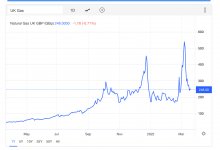3 High Pressure Schemes are at FEED and each one under-rated the whole life delivery costs to get Govt funding......... to the extent that the numbers were almost fraudulent.It's possibly feasible to replace the gas within the pipe infrastructure with hydrogen, if the pipes can take it, but most of our gas pipes are old, and the pipes within any one network can be a mix of steel, ductile iron, cast iron and polyethylene, and they're not really rated above 7-10 bar. I doubt any network is anywhere near ready, and to get them ready would take a while. Apparently a very small number are running on a lean mix of 20% hydrogen, but that's a million miles away from the whole country going on 50-100% etc.
There's zero chance of new hydrogen pipe infrastructure going in, it would be cheaper to put a wind turbine in everyone's garden. It took decades to get fibre to most of the country, and that ductwork was largely already in place. Largely just a case of pulling out one cable, feeding another in and adding a few surface mounted cabinets. 100's of meters of this a day can be done a day with a two man crew (not including the cabinets).
It would cost around £1,000/ mtr to put a hydrogen pipe in, on average, where a polyethylene pipe or telecom pipe can cost as little as £10/ mtr. Most utilities are in the £100/mtr range though, especially if it's larger contractors doing it. The problem with things like hydrogen pipes is the crazy design specs, it needs a lot of people and companies in the chain.
New H2 systems could be built and the high & medium pressure pipelines amout to almost 2000km... the gas company have done the Feasilbility studies........ but the biggest reason why they wouldn't be delivered is people.
They aren't there. The last large pipeline scheme built in the UK was a decade ago. People have either retired, died, gone overseas or gone on to other things......... IR35 doesn't help.
There is ZERO skillset within the major gas players as well. The guys at the top have no conception of what's required and obviously BEIS are clowns. The Consultants they have doing the high level high level technical, risk and value assessments....... Ernst & Young....... accountants.
I do think H2 could be the answer in the long term but those driving it within the Industry & Govt are idiots so the opportunity will probably be lost.


